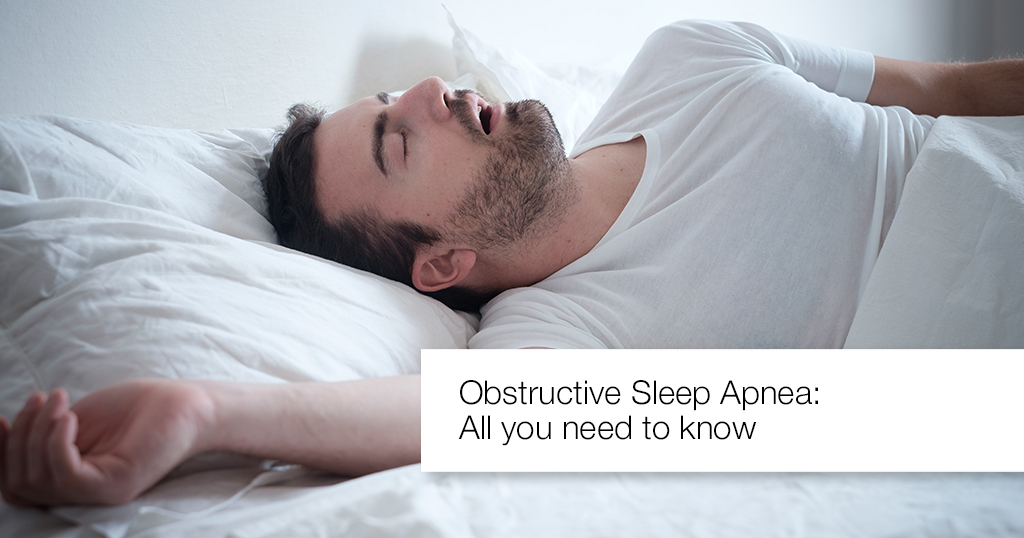Overview
Obstructive Sleep apnea is a condition that causes individuals to stop breathing for short periods during their sleep. This period is called apnea. Each episode of apnea usually lasts between 10 and 30 seconds. In severe cases, apnea can happen many hundreds of times each night, disrupting the person’s ability to get a good night’s sleep. This makes the person less alert during the day, which can lead to accidents. Individuals with untreated sleep apnea are more prone to motor vehicle accidents. People with untreated sleep apnea also are more likely to develop high blood pressure.
What is Obstructive Sleep Apnea?
Sleep apnea usually happens when the breathing airway in your nose or throat becomes blocked partially or completely. It can be blocked by large tonsils, a large tongue or by too much tissue in the airway, which is more common in people who are overweight. When the muscles of the airways relax during sleep, this extra tissue may block the breathing passages. This is called obstructive sleep apnea. Sleep apnea also can happen when the brain stem, the area of the brain that controls breathing, is damaged, for instance by an infection or stroke. This is called Central Sleep Apnea (CSA).
Symptoms of Obstructive Sleep apnea
Obstructive sleep apnea symptoms include:
- Excessive sleepiness during the waking time
- Loud snoring (bed partner may be the first to notice the problem)
- Morning headache and dry mouth
Obesity is also a common symptom, although not all individuals with sleep apnea are overweight.
Causes
Many factors contribute to the blocking or collapse of the airway including:
- Muscular changes: When we sleep, our muscles that actually keep the airway open, relax along with the tongue. This causes the airway to narrow. Generally, this does not prevent the air flow in and out of our lungs. However, in sleep apnea, it can prevent the air flow.
- Physical obstructions: Excessive fat stores or additional thickened tissue around the airway can limit the airflow. In addition, any air that squeezes past may cause loud snoring.
- Brain function: In CSA (central sleep apnea), the neurological controls for breathing are at fault. This leads to malfunction of the control and rhythm of breathing. Generally, CSA is linked to an underlying medical condition like heart failure, stroke, or recent climb to high altitude, or it could be due to the use of pain relief medicines.
When the airway gets blocked completely, the snoring stops. There is no breathing for 10 to 20 seconds or until the brain senses the apnea thus signaling the muscles to tighten to return the airflow. Such pauses in the breathing is called apnea. While this continues hundreds of times throughout the night, the person experiencing the apnea is not conscious of this problem.
Diagnosis of Obstructive Sleep apnea
Your doctor will ask whether you snore and whether you feel excessively sleepy during the day. Your doctor will examine you and look for any narrowing inside your mouth and throat. Your doctor will check the size of your neck because the larger your neck, the more likely you are to develop obstructive sleep apnea. Your doctor will check your blood pressure because people with sleep apnea are more likely to develop high blood pressure.
Many people with obstructive sleep apnea don’t have any problems with the nose, throat and mouth. In these cases, a diagnosis can only be confirmed by a sleep study, during which a person’s breathing patterns and sleep stages are monitored throughout an entire night. A daytime study of brief naps can measure the degree of daytime sleepiness and indicate the severity of the disorder.
Treatment of Obstructive Sleep apnea
To treat obstructive sleep apnea, many individuals sleep with a CPAP (Continuous Positive Airway Pressure) device. A CPAP device is a mask that fits over your mouth and nose. It forces your airways open with a stream of air. This allows you to breathe more easily. For some others, weight loss or surgical procedures may be helpful. For central sleep apnea, treating any neurological or cardiovascular disorders may get rid of the problem. However, CPAP also can be useful in these cases.
When to talk to a doctor?
Most people with sleep apnea can sleep and feel better if they follow the treatment plan recommended by the doctor. Call your doctor if you are excessively sleepy during waking hours, if you snore a lot, or if your bed partner notices that your breathing stops sometimes when you sleep.
Prevention
You can prevent obstructive sleep apnea by maintaining a healthy weight. You can also help to reduce the symptoms of sleep apnea by avoiding alcohol and sedatives.


















